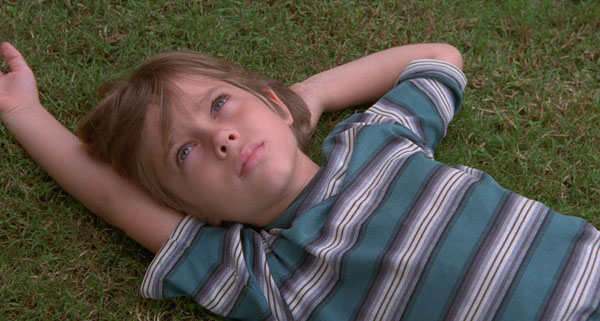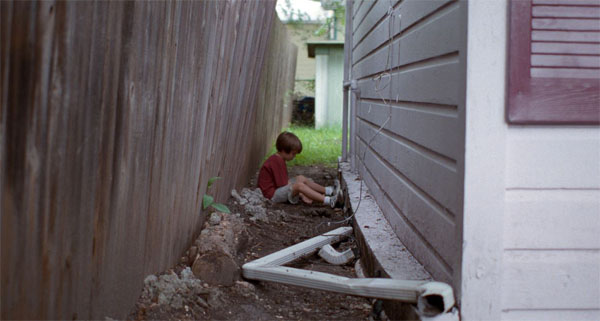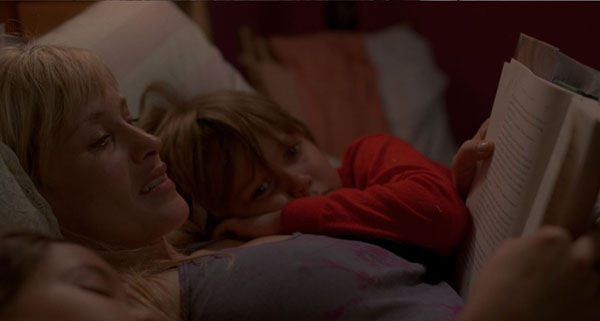From the moment it was announced that it’d be screening in Competition, Boyhood became the film I anticipated most at this year’s Berlinale. And once again, Richard Linklater has not let me down. As I noted in December, we spent much of last year celebrating Linklater’s work, the sheer durability of it at the very least, as casts were reunited—not just Julie Delpy and Ethan Hawke in Before Midnight, my favorite film of 2013, but whole crowds regrouping for reunion screenings of Dazed and Confused (1993) and School of Rock (2003)—Slacker (1991) was re-released and Gabe Klinger’s truly excellent Double Play: James Benning and Richard Linklater won a Lion in Venice.
So he’s riding high, but for how long? How many times over the past twenty-odd years has he been forgotten while he tinkers with odd little experiments like Tape (2001), only to be rediscovered and then forgotten all over again? Ten years ago, when the editors at Reverse Shot introduced their Linklater symposium, they noted that they’d “always had a thing for Richard Linklater” but that this thing kept slipping their minds. Rewatching his work up through 2004, “we discovered that Linklater had it all along. But what? Something that those such as Kevin Smith and Allison Anders promised but could never deliver, something rich and thoughtful and searching, something uttered not in one directorial voice, but in an endless array of faces and words, a panoply of ideas and dreams…. To be quite honest, we were surprised at our writers’ enthusiastic response to the idea of a Richard Linklater symposium; we’d subconsciously been underrating him even as we planned to write in his honor.”
It’s probably too early to tell whether the one-two punch of Before Midnight and Boyhood will put an end to these cycles of forgetting and rediscovery so that he can go ahead and be ushered into the pantheon once and for all. But for the time being, I suspect that if Boyhood won’t do it for him, nothing will. I’ve seen and heard the word “masterpiece” tossed around, but it’s only a few hours now since I walked out of the screening, and I’m not yet prepared to rank it higher or lower than the Before trilogy or to worry about whether a decade or two or three down the line, it’ll claim a spot in Sight & Sound‘s best-of-all-time poll or any of all that. Not right now.
What I am prepared to say upfront, though, is that Linklater’s work has always resonated with me personally, but never more so than this afternoon. I grew up in Texas from the sixth grade through grad school. I graduated from high school in 1977, one year after the class of Dazed and Confused. The Austin I knew when I was studying film and then literature at the University of Texas (and partying and going to shows and collecting records and doing all the things college kids do, some of them legal, some not) is pretty much the Austin of Slacker. I still return to Austin once year every March for SXSW—to see films, yes, but also to see family and friends. As I noted in 2012, seeing Bernie, “set in Texas, featuring Texans talking about Texas and other Texans, with an audience of Texans (in Texas) who were just loving it,” was the most fun I had at the movies that year. I may have been living in Berlin now for nearly twenty years, but I am most definitely from Texas.
And so is Mason Evans, Jr., who grows up before our eyes, from a boy of six to a young man of eighteen, in 164 minutes. Last month, when Boyhood premiered at Sundance, I posted an entry rounding up early reviews, an entry that was updated until just a couple of weeks ago. So, here, I don’t need to list cast members or outline plots (yes, plural; there are many within the overall arc); all you need to know is that, starting in 2001, Linklater would get the cast and crew together for a few days, shoot some scenes, then be off before getting together again months, maybe a year later, shoot some more, and so on over a period of twelve years.
Without reiterating too many of the points already made in those previous reviews, I do want to emphasize that, yes, Linklater (like the makers of the franchise that makes a showing in Boyhood, Harry Potter) was very, very lucky indeed to have chosen the right kid for his lead. As a boy, Ellar Coltrane, unassuming, somewhat sympathetic, not particularly extraordinary in any one aspect or another, is just right; as a teenager, though, he’s a phenomenon, quietly heart-breaking and somehow emanating something of the very essence of the late Oughts and early 2010s. At this point in the film, the chiming of inner bells had more to do with my own teenage son right now than with memories of my past.
There’s no avoiding a few quick words on other outstanding performances, beginning with Patricia Arquette, who embodies contemporary American Momness while winning our empathy for her struggles—raising two kids alone, going to school, bringing home the bacon—without being showy about it. Ethan Hawke starts out pretty much as Ethan Hawke but then slowly morphs into someone we’ve never him take on before, a man who realizes that he has no choice but to let go of his dreams, at least in part because he never really knew what those dreams might have been in the first place. And Marco Perella, who turns from just another dork into an utterly convincing and unexpectedly terrifying abusive husband and father.
I’d also agree—to a limited extent—with those who’ve pointed out that we can watch Linklater evolve as a filmmaker over the course of Boyhood. The first scenes are indeed less accomplished than most of what comes after them, but I wonder if, at that early stage, Linklater was in more of a “let’s try this out” mode than he would have been years later when he saw it taking shape and gathering weight and substance and maybe—who knows—demanding a little more time and attention.
There are countless scenes replaying in my mind at the moment, but I want to make one last point: Boyhood is often funny and occasionally even downright hilarious. Hawke pulls off more than a few exquisitely comic moments, one of them being his gentle chiding of Mason and his sister (Lorelei Linklater, the director’s daughter who steals a good handful of scenes early on) for treating him like the classic “biological father.” But two back-to-back scenes set during the 2008 election absolutely brought down the house (and it’s a big house; the Berlinale Palast seats 1600). The line “Do I look like a Barack Hussein Obama supporter?” sparked a clap of thunderous laughter, but the mini-soliloquy from the actual Obama supporter was met with an even more boisterous response—because it is impossible to imagine hearing what this supporter has to say just a year or two after Obama took office, much less in 2014.
Linklater is a keen observer in general, of course, but he’s got an especially sharp eye—and ear—for objects, sounds, tunes and phrases that define a particular moment even as he’s living it, and he applied this unique sense of his for over a decade while making Boyhood. I won’t say exactly when, but at some point, Mason finds himself in Big Bend, the stunning national park out in west Texas, and in a special state of mind as well (yep, I’ve done that out there, too). And out comes a line that, while it scores a well-earned laugh, might also have come from any number of movies by Richard Linklater: “It’s, like, always right now.”
Boyhood is the only film I want to be thinking about today. More notes on more films tomorrow—and on Saturday, the awards.
Updates, 2/21: “Humanistic, warmly optimistic, and still somehow unsentimental and melancholic, this is a film of such sincerity and honesty, that its collection of small observation accumulate as real wisdom,” writes Adam Cook in the Notebook. “So: Linklater has made a ‘life is beautiful’ movie, but it’s one made of real nuance. It’s hard not to be convinced by its conviction in the preciousness of passing moments, the gathering of memories, the opening of possibilities.”
John Semley at the House Next Door: “Linklater possesses a rare attentiveness to the fineries of human interaction and, even more importantly, exhibits an apparent affection for people, in all their gawkiness and peccadilloes, even in their self-destructiveness. In Bernie, his sensitivity and generosity enlivened a set of weirdoes all impassively embroiled in a small town conspiracy. In the Before trilogy, his thoughtfulness plays out across the wearying of a romantic relationship. Dazed and Confused remains one of the light-touch masterpieces of its decade precisely because of Linklater’s apparently effortless ability to just let the laidback bustle of the Austin suburbs sort of reveal itself at its own pace. But never before has the director’s sensibility come to bear so fully, persuasively, and sensitively over what feels like whole range of human experience.”
For Giovanni Marchini Camia, dispatching to Film Comment, Boyhood is “a portrait of youth every bit as delicate and expansive as the adult relationships he realized in his Before trilogy.”
Tom Christie at Thompson on Hollywood: “Sometimes you want to say, simply, go see this movie, and leave it at that.”
Jessica Kiang at the Playlist: “A few days before Linklater would be up on stage accepting his Silver Bear for Best Director, we had the pleasure of talking to him about how he approached Boyhood, time, memory, the universal, the specific and Sheryl Crow.”
For news and tips throughout the day every day, follow @KeyframeDaily on Twitter and/or the RSS feed. Get Keyframe Daily in your inbox by signing in at fandor.com/daily.






